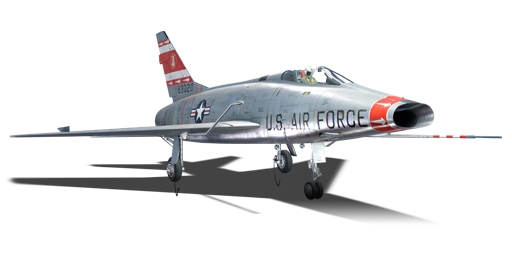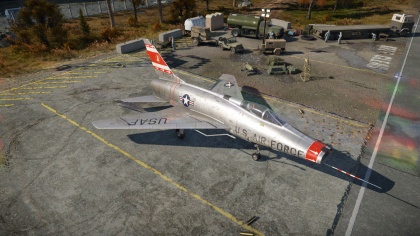Difference between revisions of "F-100D"
(→Description) |
Inceptor57 (talk | contribs) m |
||
| Line 5: | Line 5: | ||
[[File:GarageImage_{{PAGENAME}}.jpg|420px|thumb|left|The '''{{PAGENAME}}''' in the garage]] | [[File:GarageImage_{{PAGENAME}}.jpg|420px|thumb|left|The '''{{PAGENAME}}''' in the garage]] | ||
{{break}} | {{break}} | ||
| − | The '''{{Specs|name}}''' is a Rank {{Specs|rank}} American jet fighter {{Battle-rating|1}}. It was introduced in [[Update 1.85 "Supersonic"]] and was one of the first three jets to feature guided air-to-air missiles, the other two being the [[MiG-19PT]] and the [[Javelin F.(A.W.) Mk.9]]. The F‑100D is the top-rank aircraft in the American fighter line-up. | + | The '''{{Specs|name}}''' is a Rank {{Specs|rank}} American jet fighter {{Battle-rating|1}}. It was introduced in [[Update 1.85 "Supersonic"]] and was one of the first three jets to feature guided air-to-air missiles, the other two being the [[MiG-19PT]] and the [[Javelin F.(A.W.) Mk.9]]. The F‑100D is, as of 1.87, the top-rank aircraft in the American fighter line-up. |
== General info == | == General info == | ||
Revision as of 21:58, 28 March 2019
Contents
Description
The F-100D Super Sabre is a Rank VI American jet fighter
with a battle rating of 9.3 (AB/RB) and 9.7 (SB). It was introduced in Update 1.85 "Supersonic" and was one of the first three jets to feature guided air-to-air missiles, the other two being the MiG-19PT and the Javelin F.(A.W.) Mk.9. The F‑100D is, as of 1.87, the top-rank aircraft in the American fighter line-up.
General info
Flight Performance
| Characteristics | |||||||
|---|---|---|---|---|---|---|---|
| Stock | |||||||
| Max Speed (km/h at 10668 m) |
Max altitude (meters) |
Turn time (seconds) |
Rate of climb (meters/second) |
Take-off run (meters) | |||
| AB | RB | AB | RB | AB | RB | ||
| 1,441 | 1,431 | 14700 | 40.6 | 42.1 | 65.9 | 64.4 | 1,400 |
| Upgraded | |||||||
| Max Speed (km/h at 10,668 m) |
Max altitude (meters) | Turn time (seconds) | Rate of climb (meters/second) |
Take-off run (meters) | |||
| AB | RB | AB | RB | AB | RB | ||
| ? | ? | 14700 | ??.? | ??.? | ??.? | ??.? | ??? |
Details
| Features | ||||
|---|---|---|---|---|
| Combat flap | Take-off flap | Landing flap | Air brakes | Arrestor gear |
| ✓ | ✓ | ✓ | ✓ | X |
| Limits | ||||
|---|---|---|---|---|
| Wing-break speed (km/h) |
Gear limit (km/h) |
Combat flap (km/h) |
Max Static G | |
| + | - | |||
| 1361 | 447 | 620 | ~?? | ~? |
| Optimal velocities | |||
|---|---|---|---|
| Ailerons (km/h) |
Rudder (km/h) |
Elevators (km/h) |
Radiator (km/h) |
| < 640 | < 540 | < 610 | > 300 |
| Compressor (RB/SB) | ||
|---|---|---|
| Setting 1 | ||
| Optimal altitude | 100% Engine power | WEP Engine power |
| 0 m | 4205 kgf | No WEP available |
Survivability and armour
Examine the survivability of the aircraft. Note how vulnerable the structure is and how secure the pilot is, whether the fuel tanks are armoured. Describe the armour, if there is any, also mention the vulnerability of other critical aircraft systems.
Armaments
Offensive armament
Describe the offensive armament of the aircraft, if any. Describe how effective the cannons and machine guns are in a battle, and also what belts or drums are better to use. If there is no offensive weaponry, delete this subsection.
Suspended armament
Describe the aircraft's suspended armament: additional cannons under the wings, bombs, rockets and torpedoes. This section is especially important for bombers and attackers. If there is no suspended weaponry remove this subsection.
Usage in battles
Describe the tactics of playing in an aircraft, the features of using vehicles in a team and advice on tactics. Refrain from creating a "guide" - do not impose a single point of view, but give the reader food for thought. Examine the most dangerous enemies and give recommendations on fighting them. If necessary, note the specifics of the game in different modes (AB, RB, SB).
Manual Engine Control
| MEC elements | ||||||
|---|---|---|---|---|---|---|
| Jet engines do not have controllable parts | ||||||
Modules
| Tier | Flight performance | Survivability | Weaponry | |||
|---|---|---|---|---|---|---|
| I | Fuselage Repair | Compressor | M64 | LAU-3A | ||
| II | New Boosters | Airframe | Offensive 20 mm | M64/2 | AGM-12B Bullpup | |
| III | Wings repair | Engine | M117 | AIM-9 | ||
| IV | G-suit | Cover | New 20 mm cannons | M65 | ||
Pros and cons
Pros:
- Excellent guns that have both high muzzle velocity, rate of fire, plenty of ammo (200 rpg), and pack a good punch with high-explosive shells.
- Can carry a wide array of suspended armaments of bombs, rockets and missiles.
- Its air to air missiles(AIM-9B and E) have a longer reach than the missiles on the MiG-19PT
- Fast and out-accelerates both MiG-15 and MiG-17's
Cons:
- Thoroughly unmanuverable at slow speeds, and does absolutely not lend itself to traditional turning dogfights
- Suffers from severe lockup past the Mach 1 mark
- Bleeds a lot of energy when trying to turn around at high speed
- While fast, it still accelerates a lot slower than MiG-19PT
History
By the mid-50s, jet aircraft had become robust machines which had obtained sufficient combat experience for the next step into a fundamentally new age: the era of supersonic speed. Supersonic fighters were developed by both of the main opposing nations of the Cold War. In parallel with the development of the MIG-19 in the USSR, American aircraft designers were putting the finishing touches on their own design for a supersonic fighter. The F-100 Super Sabre entered serial production somewhat later than its Soviet counterpart, but it needed just as many improvements and upgrades.
The F-100’s main problems were its high failure rate and the shortcomings of its control systems. In addition, a fighter-bomber version was also being developed based on the Super Sabre: the F-100D, which featured an increased vertical and horizontal fin area and expanded capabilities with regard to suspended weaponry. In the end, it was the D version that became the most widespread modification of the single-seat Super Sabre thanks to its improved control and excellent combat abilities as either a fighter-bomber or pure fighter. In terms of suspended weaponry, the F-100D was able to carry over twenty extremely varied weapon loadouts, from traditional high-explosive bombs and rockets to air-to-air rockets and nuclear bombs.
- From Devblog
Media
An excellent addition to the article will be video guides, as well as screenshots from the game and photos.
See also
Links to the articles on the War Thunder Wiki that you think will be useful for the reader, for example:
- reference to the series of the aircraft;
- links to approximate analogues of other nations and research trees.
External links
| USA jet aircraft | |
|---|---|
| Fighters | |
| F9F | F9F-2 · F9F-5 · F9F-8 |
| F-80 | F-80A-5 · F-80C-10 |
| F-84 | F-84B-26 · F-84F · F-84G-21-RE |
| F-86 | F-86A-5 · F-86F-25 · F-86F-2 · F-86F-35 |
| F-89 | F-89B · F-89D |
| F-100 | F-100D |
| F-104 | F-104A · F-104C |
| F-4 | F-4C Phantom II · F-4E Phantom II · F-4J Phantom II · F-4S Phantom II |
| F-5 | F-5A · F-5C · F-5E · F-20A |
| F-8 | F8U-2 · F-8E |
| F-14 | F-14A Early · ▄F-14A IRIAF · F-14B |
| F-15 | F-15A · F-15C MSIP II · F-15E |
| F-16 | F-16A · F-16A ADF · F-16C |
| Other | P-59A · F2H-2 · F3D-1 · F3H-2 · F4D-1 · F11F-1 |
| Strike Aircraft | |
| FJ-4 | FJ-4B · FJ-4B VMF-232 |
| A-4 | A-4B · A-4E Early |
| A-7 | A-7D · A-7E · A-7K |
| AV-8 | AV-8A · AV-8C · AV-8B Plus · AV-8B (NA) |
| A-10 | A-10A · A-10A Late · A-10C |
| F-111 | F-111A · F-111F |
| Other | A-6E TRAM · F-105D · F-117 |
| Bombers | |
| B-57 | B-57A · B-57B |





